|
Love at Lost Lagoons is the third novella in the linked series Stations of the Heart, set in outback Australia in the 19th century. It can be read as a standalone story or after Lord Muck and Lady Alice and Love and Other Addictions.
This novella tells the story of reclusive bachelor, Walter Jamison, who runs a struggling north Queensland pastoral station he desperately wants to turn into a paying concern. His isolated life is shattered by the arrival of Elizabeth Chesterfield, a young woman determined to escape an arranged marriage being forced on her by her scheming brother. Walter and Elizabeth fall in love while Elizabeth’s brother and her ‘fiancé’ camp on the other side of the flooded river. What will happen when the waters recede? Read an excerpt: North Queensland, December 1879 Elizabeth’s rasping breath thundered in the clear night air. Her booted foot snagged a tree root. “Umph.” She hit the ground hard. Dragging air back into her aching lungs, she scrambled to her feet. Elizabeth stared back along the track, straining to see into the shadows made by the trees in the moonlit night. Did someone move within them? The chill creeping down her spine told her there was something more. All around her the bush shimmered with the movements of unseen creatures. An owl hooted its haunting sound. Dread knotted her stomach. Had they discovered she was gone from camp and were following her? Her heart thundering in her ears, Elizabeth ran on through the dappled darkness along the lonely track. She prayed that by dawn she would be far, far away from them. Surely, if she could follow this path south she would reach the track that led back down the range, back to the coast, back to the port where their long slow journey westward had begun. There would be a boat to catch. There had to be. Elizabeth stumbled and fell again. Her long skirt and petticoats hampered every move, but she dared not take them off in case they were found and showed her direction. She lurched onward. How much further? She must get to the top of the range before sunrise, when they would notice her disappearance. As dawn’s first blush kissed the eastern sky, Elizabeth leant against the papery trunk of a ti-tree and struggled to silence her heaving breaths. Ahead, in the clearing where they had camped the previous night, was a four-wheel dray, resting on the grass like an enormous horned beast. Bells hung off the necks of its hobbled bullock team clanged dully amongst the surrounding trees. The bullock driver lay rolled in a blanket between the dray and a dwindling fire. Where was he headed? The vehicle faced towards the track down the range. It must be heading towards the coast. She tried to swallow the lump of fear in her constricted throat. Could she make it past the man and onto the dray’s load without disturbing him? Her hands prickled with sweat. Slowly, so slowly, she eased herself across the open ground to the dray. Her heart pounded beneath her chemise. The man hadn’t stirred. Nor had the huge dog that lay beside him, its paws twitching in its sleep. Elizabeth held her breath and raised the stiff canvas where its ropes were untied. She hitched her skirt and petticoats to her knees and climbed up the spokes of the wheel onto the close-packed goods underneath. Sacks of something formed a hard layer. She inched forward seeking the centre of the load. She needed to be far from the opening through which she had crawled, when the man awoke. Her legs ached from the unaccustomed running. Tiredness scratched her eyes. She must stay alert … at least until she knew she was undetected and her transport was on its way to the coast. The sounds of dawn were louder now. Raucous and chortling birdsong greeted the new day. Surely the man must wake soon. Within minutes, came the sound of a deep voice and the tell-tale stamp of boots and herding of bullocks through the bush as the bullock driver re-assembled his team, his dog snapping at their heels. The dray rocked and creaked as the beasts were harnessed into their yokes. The job seemed to take forever but eventually the bumping ceased. The man’s sleep-roughened voice called to the dog. “Stop sniffing around the dray, there’s nothing in that load for you to eat.” From nearby came the crackle of his renewed camp fire. Soon, a billy can swung through the air with a whoosh. She knew that sound now. Next the stomp and clatter of the camp being broken up. A chink of light showed under the canvas beneath which Elizabeth sheltered as something—probably his bed roll and cooking gear—were restored to the dray’s load. With the crack of a whip the man called, “Walk on, Perseus, Hector, Hercules.” The dray rocked once, twice, but didn’t move forward. “Get them moving,” the man ordered. His dog responded with high pitched barks. Bellows of outrage answered the snapping of its jaws. The dray jerked. Elizabeth imagined the animal nipping the bullocks’ hocks and the beasts lashing out with their hooves while the dog dodged their intended blows. Through the combined efforts of man and dog, the dray soon lurched and creaked into motion. It wheeled in a wide arc, then settled into a steady plodding tempo. Now the dray was moving, Elizabeth permitted her stinging eyes to close. The rough descent down the range later would keep her well and truly awake. Stopping the dray from ending up down one of the steep gullies that lined the rugged track would take all the teamster’s persuasive powers. It took only moments for her mind to drift into exhausted oblivion. *** Elizabeth jolted awake—her heavy eyelids snapped open, her muscles clenched for flight. Canvas stretched above her, rough sacking scratched her arm. She slumped back onto the load. She was on the dray, not in her brother’s roadside camp. She heard … nothing … well not silence, but no patient deep voice calling upon the bullocks with their classical names or to the cattle dog to keep them moving. The creak and sway of the dray was gone also. Those background noises and movements, which had lulled her into sleep, were gone. How long had she slept? The outside sounds were no longer those of dawn. Instead, waves of cicada song pulsed through the bush. The air around her was stuffy. Perspiration dampened her underclothes. A thirst all the rain in England couldn’t quench parched her mouth. Hunger gnawed at her stomach. The bread and apples she had taken when she escaped her brother had been eaten before sunrise. There might be a few crumbs in her pocket. She would have to wait until nightfall and the bullocky’s sleep until she could move from her hiding place. There must be food on the dray she could eat. Surely? Her limbs ached from being cramped in the same position. What was happening? Where was the man with the steady voice? Why had she slept so long? The range descent should have woken her. Distant voices sounded. And came closer. Brisk steps clumped nearby. Something was happening to the tarp. Its tight form loosened, and light shafted in from the back of the dray. Elizabeth wriggled further away, easing herself towards the front. Which corner was furthest from the man who was now taking some of the load from the tail of the dray? She crept to that farthest point. The tarp there was no longer pulled taut by the ropes that had kept it in place. She eased the canvas open. Could she get down from this height and run for the bush? More men’s voices reached her ears. And they were approaching! She had to move soon or she would be found. Elizabeth lifted the canvas. No-one in sight. The men congregated at the rear of the dray. She inched her body round on the sacks until her legs were positioned over the edge of the load, then slid clumsily to the ground. “Umphf.” She landed in an inelegant heap on the dirt and scrambled under the dray on all fours. Sitting cross-legged on the bare earth, she rubbed the spot where she had hit her head on the vehicle. Several sets of legs showed at the rear of the dray. They were unloading it. Men with sacks on their shoulders walked towards a cluster of buildings. The deep voice of the bullock driver, commanding and cultured, directed them. Where am I? A low-slung slab house stood nearby, overlooking a long lagoon. In the opposite direction were a number of timber buildings and yards erected down a long slope running away from the house. At a pastoral station. The men walked closer. Scuffed work boots stood within inches of her hiding place under the dray. At any moment one of them would lean down and see her. She shrank back, body rigid. If she could stop her breathing and the loud beat of her heart, she would. After an eternity, while the goods were hefted from the flat tray above, the men departed. As soon as the last one disappeared down the rise towards the yards and buildings beyond them, Elizabeth crept from her hiding place. She edged alongside the waiting bullocks. They tossed their heads, as she inched past. Don’t bellow, please. A line of bush stood about a hundred yards away. If she could make it there without being seen, she would have some chance of escape. Had she been delivered to her brother’s property? Surely not? She hadn’t heard him. Elizabeth drew in line with the leading beast. It stamped a hoof and tossed its broad head, sending her heart galloping. She clutched a hand to her chest and sucked in a steadying breath. The wide gap to the trees had to be faced and conquered now. Oh, god. Elizabeth gathered her skirts in her hands, swallowed drily past her constricted throat, and ran. One step, two… “Oi!” A shout exploded the late afternoon quiet. She sprinted even faster. The bushes were closer now, but the heavy steps behind her were getting louder. She had almost made the tree-line. Please, please, let me reach safety. Her heart pounded, threatening to burst from her chest. A heavy hand slammed onto her right shoulder like an axe thumping down on kindling. Elizabeth’s knees buckled. A strangled scream burst from her mouth as she crumbled to the ground. His long, hard fingers, roughened with callouses, bit into her shoulder. She struggled with all her might. He didn’t let go. Fear, dark and menacing, seized her body, sending her heart thumping wildly. He hauled her to her feet. “What are you doing here?” he demanded. She gulped air like a drowning sailor swallowing water. She couldn’t have answered him if she had wanted to. She could only stare into his eyes, the colour of the tawny port her mother had allowed her to sip when ill. They looked fierce in his tanned face. Bushy auburn mutton chop sidelevers, of the kind that had been popular a decade ago but had fallen out of fashion, framed his face. A shaggy moustache straggled across his upper lip, half hiding the grim line of his mouth. “Where have you come from?” His frowning face was just inches from hers. She shrank back. “I … can’t … tell … you.” The words puffed out on short breaths. “Who are you?” She would never tell him. He would take her straight back to her brother. “Are you running away from your employer? “No!” The word burst out of her mouth, as she rocked forward. “Your husband?” Never. “I’m not married.” And I won’t be if I can do anything to stop it. “I want to go back to Cardwell. Are we close?” “No, we’re several days’ journey away.” Despair, bleak and heavy, hugged her. “Can you take me there?” “No, I’ve just come back from there. The rains are due. Look at the clouds.” He pointed up at the threatening sky to the east where steel grey clouds rolled towards them. “All the creeks and rivers between here and the coast will be over their banks once that rain falls.” He pulled her, unwilling and resistant, for a couple of steps. With a growl of annoyance, he grasped her about the waist and lifted her from the ground. Elizabeth yelped. She squirmed and kicked him with her heels, and tore at his hands, but it made no difference. His muscular body braced against her back like a wall, as his huge strides consumed the distance to the buildings. Available on pre-order for 99cUSD until release on May 15: Amazon US Amazon UK Amazon AU Amazon CA B&N, Kobo, Apple, other
0 Comments
If you've read any of these books and enjoyed them, please leave a review on any of these sites:
Amazon: http://amzn.to/1nBe6re Kobo: https://store.kobobooks.com/search?Query=isabella+hargreaves Barnes & Noble: http://bit.ly/1pk7UFG Reviewing a book only needs to be a few words long or a star rating. I'm grateful for every single one! Thank you, Isabella H. P.S. If you're interested, an Isabella Hargreaves Readers' group has formed to discuss my books: https://www.facebook.com/groups/223984487953919/ #historicalfiction, #Historicalromance, #romance
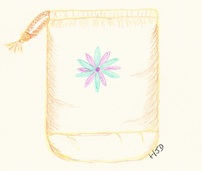 Synonymous with the Regency period and its associated romance genre is the reticule. This vital accessory was a small, often drawstring, bag. Women carried essential items in this precursor handbag. In previous eras they kept these items in a pocket hung about their waists and hidden amongst the layers of their clothes. However, the lightweight and slim-line dresses of the Regency period, designed to fall gracefully and emulate the classical clothing of the ancient Greeks and Romans, did not accommodate such a device. Instead, essential items were carried in a reticule looped around the wearer’s wrist or held in her hand. Popularly, they were made of linen, silk, velvet or soft leather, perhaps decorated with embroidery or with a knotted fringe. A variety of shapes were used. Inside a reticule, one could expect to find a small coin purse, letters, a handkerchief, a pocket book and smelling salts or scented water in a bottle. Jane Brody, the heroine of The Persuasion of Miss Jane Brody, carries important papers in her reticule: “By the time Jane had completed her essay an hour later she had talked to herself sternly and returned to reality as she dusted the document with sand, rolled it up and slid it into her reticule for delivery.” “Jane retrieved the list from her reticule and passed it to her friend who read it carefully before walking to her secretaire to add some more names.” Neither Jane nor Elizabeth Everslie, sister of the Marquis of Dalton would go anywhere without a reticule, even to a ball: “Turning to his sister, he asked, “Are you ready to depart, Elizabeth?” She agreed and gathered her reticule and shawl.” “At eight o’clock a loud rap on the knocker of Reverend Brody’s front door sounded and the housekeeper, Mrs Creevy, hastened to answer it. Jane was still upstairs assisting her sister with her hair combs. She heard a masculine voice and assumed the coachman’s offsider had come to the door to inform them of the carriage’s arrival. She immediately collected her reticule.… She hurried down the staircase only to halt halfway down the last flight of stairs, pinned by the arrested look on Lord Dalton’s face as he stood in the hallway below looking up at her.” I don’t suppose the Marquis of Dalton noticed Jane’s reticule, but she would have been lost without it. Do you have a favourite scene in a Regency book that features the heroine’s reticule? Sources: ‘1800 Accessories – Regency Fashion History’, <http://www.fashion-era.com/1800_accesories.htm#Reticule Handbags> accessed 26 Mar 2015. Jane Austen's Sewing Box: Craft Projects and Stories from Jane Austen's World. Murdoch Press, London, 2009, pp.181-6. Link: http://jenniferforest.typepad.com/jennifer-forest/books.html Isabella Hargreaves, The Persuasion of Miss Jane Brody, Steam eReads, ebook, 2013.
If you're interested, a round-up of reviews from this week's book tour for All Quiet on the Western Plains can be found here: http://www.isabellahargreaves.com/news-and-events.html. The winner of a copy of the novella has been drawn. Congratulations if it was you!
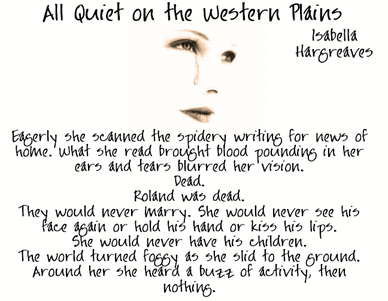 Join me on tour 15-21 May to launch All Quiet on the Western Plains. As usual there's a book giveaway drawn at the end of the tour. "One war, two battle-scarred hearts, one chance for happiness. " First stop is: http://bookwormbridgette.blogspot.com/2014/05/blog-tour-all-quiet-on-western-plains.html 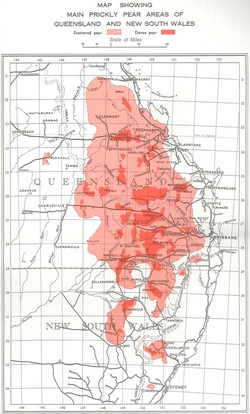 Source: A P Dodd, 1940. Source: A P Dodd, 1940. During the 1920s, the biggest concern for many people in country Queensland, aside from the weather, was the rapid spread of the pest cacti commonly known as prickly pear. From Mackay in central Queensland to central New South Wales, these plants were multiplying and choking the land. They had been introduced into Australia from North and South America during the nineteenth century. Warnings of their capacity to multiply and make good land useless began in the 1870s, but it wasn't until the 1890s that bylaws and legislation requiring their removal were created. By the early twentieth century, the need for a biological control of the pest had been recognised. Although an effective poison to kill the cacti was determined in 1916, obtaining it during World War One was difficult and Australia's manpower and the money to control prickly pear were employed overseas. Finally, in 1919, the Commonwealth Government and the governments of Queensland and New South Wales established a joint project, to discover and introduce into Australia biological pests of prickly pear, to control its spread. Achieving this goal was to take 10-20 years, but the introduction of Cactoblastis cactorum and a number of other parasites of the cacti, was an outstanding success. Not all of Queensland was affected by prickly pear. Open plains were generally spared the infestation - among them the plains of western Queensland. It is here that my latest book, All Quiet on the Western Plains is set. The characters therefore weren't involved in the struggle to control prickly pear that was going on in much of rural Queensland in 1924. Does your family have a story from the bad old days of Prickly Pear? I would love to hear from you. All Quiet on the Western Plains - available 1 May 2014 - from Amazon, Steam eReads and Book Srand. References: Dodd Alan P. The progress of biological control of prickly pear in Australia. Commonwealth Prickly Pear Board, Brisbane, 1929. Dodd Alan P. The biological campaign against prickly-pear. Commonwealth Prickly Pear Board, Brisbane, 1940. Dodd, Alan P. ‘The Conquest of Prickly-Pear’. RHSQJ, 1945, 3, 5, pp. 351-61. Mann, John. The Naturalised Cacti in Australia, Queensland Lands Department, Brisbane, 1970. 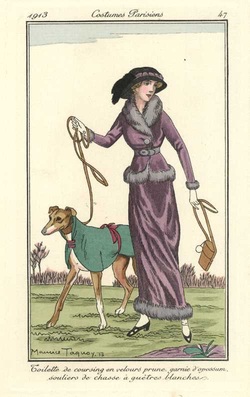 While working on my latest book, All Quiet on the Western Plains, I looked at fashions in the 1910s and '20s, and have since found some lovely French fashion studies from the period advertised online. They are from hand-painted pochoirs (stencils) - using gouache and watercolour - dating from circa 1912- circa 1925. I think the fashions are gorgeous! See what you think. Go to the following link, if you're interested (b.t.w. I have no connection to this business) : https://www.antiqueprintclub.com/c-23-fashionpochoir.aspx If you would like further information about pochoir and the journal in which they were published (Gazette Du Bon Ton - Mode et Frivolites) see: http://antique-print-club.blogspot.com.au/ 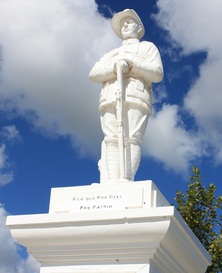 WWI memorial, Crows Nest, Qld. WWI memorial, Crows Nest, Qld. With the hundredth anniversary of the start of World War One approaching, I have been reading lots of autobiographies and biographies of soldiers and nurses who served in Europe and the Middle-East. A few months ago all this reading sparked the idea for my forthcoming novella, All Quiet on the Western Plains. English nurse Fleur Armitage wants to escape all reminders of the Great War, which killed family, friends and patients - by living as far from its reminders as possible - in outback Queensland, Australia. Jack Edgarson is a war hero, pastoralist and damaged man. Suffering from nightmares and sleep walking, he fears he may harm someone, so lives in isolation. Through a chance meeting, their lives become entangled. They come to share a love of the wide western plains, but dare they love each other? For some World War One autobiographies and biographies, see my sources page on this website. All Quiet on the Western Plains – available 1 May 2014 – from Steam eReads and Amazon. |
Archives
June 2024
Categories
All
|





 RSS Feed
RSS Feed